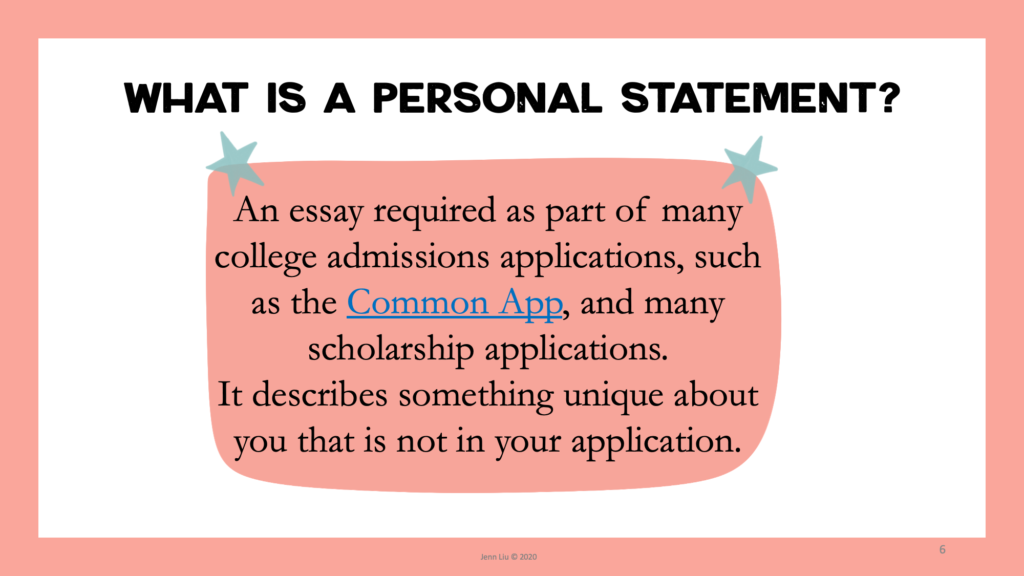How would you like it if all your students had at least one amazing personal statement essay by the end of the first quarter of their senior year?
That would be pretty epic, right? Well, this is entirely possible.
Teaching students how to write a personal statement can seem daunting at first, even if you’re an English teacher.
Not only is the personal statement a very unique type of essay, but it’s also an important factor in college admission decisions (see this report).
And if you’re not an English teacher, the task is even more challenging.
The best way to get started is by making sure your students have a clear idea of what the personal statement is.
Simply put, the personal statement, also called the college essay, is an essay required as part of many college admissions applications, such as the Common App, and many scholarship applications.
The personal statement should describe something unique about the applicant that’s not in the application.
Many college and scholarship applications not requiring the Common App will require a similar essay with directions ranging from specific to general.

The Common App directions say:
“The essay demonstrates your ability to write clearly and concisely on a selected topic and helps you distinguish yourself in your own voice. What do you want the readers of your application to know about you apart from courses, grades, and test scores? Choose the option that best helps you answer that question and write an essay of no more than 650 words, using the prompt to inspire and structure your response. Remember: 650 words is your limit, not your goal. Use the full range if you need it, but don’t feel obligated to do so. (The application won’t accept a response shorter than 250 words.)”
Here are the 2024-25 Common App essay prompts:
1. Some students have a background, identity, interest, or talent so meaningful they believe their application would be incomplete without it. If this sounds like you, please share your story.
2. The lessons we take from obstacles we encounter can be fundamental to later success. Recount a time when you faced a challenge, setback, or failure. How did it affect you, and what did you learn from the experience?
3. Reflect on a time when you questioned or challenged a belief or idea. What prompted your thinking? What was the outcome?
4. Reflect on something that someone has done for you that has made you happy or thankful in a surprising way. How has this gratitude affected or motivated you?
5. Discuss an accomplishment, event, or realization that sparked a period of personal growth and a new understanding of yourself or others.
6. Describe a topic, idea, or concept you find so engaging it makes you lose all track of time. Why does it captivate you? What or who do you turn to when you want to learn more?
7. Share an essay on any topic of your choice. It can be one you’ve already written, one that responds to a different prompt, or one of your own design.
Note: The University of California schools do not use the Common App but the directions are similar:
“You will have 8 questions to choose from. You must respond to only 4 of the 8 questions. Each response is limited to a maximum of 350 words.”
As the questions are similar, many of the strategies used to write the personal statement for the Common App could apply to writing the essays for the UC application. Your students can just shorten their Common App essay and use it for one of their UC essays. Then they could use the remaining UC essays for the Common App supplemental essays. For other colleges and scholarships that don’t use the Common App, your students could similarly “tweak” their Common App essay to meet the specific directions for these other applications. Obviously, they may need to make a few adjustments (e.g., word count) depending on the prompt and directions.
In giving a general overview of the personal statement, tell students that a personal statement should:
- Show the real you.
- Give you a chance to stand out.
- Tell whether you will contribute any value to the school you are applying to.
- Reveal if you can write.
To make their personal statements strong, remind students their essays should:
- Stand out and not be common.
- Be authentic.
- Focus on you and not another subject.
- Be well-written and to the point.
Suggest students try to be outstanding without being pompous! Some questions to give them to think about are:
- Did you accomplish something impressive?
- Do you have an unusual skill or “superpower”?
- Do you have a big vision or dream?
Encourage students to show vulnerability–e.g., how they failed but learned something, accidentally discovered their passion, developed a relationship, learned a life lesson, or took a risk leaving their comfort zone.
Advise students to show, but don’t tell.
“Show, don’t tell” in a nutshell means to illustrate, rather than state what happened. Here are some tips:
- Describe the setting of your narrative through your interactions and perceptions of the setting. (e.g., I could feel the dry yellow leaves crunch under my feet as I zipped up my jacket.)
- Add dialogue to show the unique way people in your story talk. (e.g., “No talk to me li’ dat,” my mom snapped back in her native Hawaii Pidgin English.)
- Use sensory details and figurative language without overdoing it.
And don’t forget…
It’s also important to have a short reflection at the end that relates their story to what they want to pursue in the future (e.g., how their experiences and values impact their goals).
Here are some other tips you can give students:
- Do not make your essay all about a subject (e.g., your intended major or career or a passion). Instead, write about how you changed or what you learned or gained from an experience or influential person.
- Write well and to the point. Be clear and succinct.
- Be natural and write like yourself (avoid too many fancy or pretentious words such as “plethora” or “cognizant” and too much jargon or unrealistic claims or imagery).
- Avoid redundancy.
I also always stress to students that colleges favor students who show intellectual vitality, or the love of learning for the sake of knowledge alone — that is, students who show genuine curiosity in something. And the most selective schools, e.g., the Ivy Leagues and the Little Ivies, prefer students who pursue interests related to their core values and making an impact in their community or on the world.
Here are some things students should not do in a personal statement:
- Start with a famous quote (overdone).
- Brag, sound pretentious, or write about all your accomplishments without connecting them to a value or meaningful, unexpected lesson.
- Preach, whine, or be negative, critical, or sour.
- Show privilege (e.g., describing a ski trip or having housekeepers, etc.).
- Write a five-paragraph essay with a thesis statement.
- Use clichés (overused expressions=unoriginal and boring).
Finally, tell students that while they can write just about anything for essays with vague directions, it will be more interesting if they tell it as a story!
Tip: I suggest encouraging your students to try several drafts on different topics and then choose the best one.
Now, instead of just explaining all of the above to students in a lecture, I would present these tips in an interactive presentation with eye-catching visuals and some hands-on practice using graphic organizers. Fret not, I have a done-for-you lesson to make this important essay much less daunting for both you and your students.
This lesson not only gives an overview of the personal statement but also takes students through the writing process step-by-step!
Check out THIS RESOURCE for a great Google Slides lesson on how to write a personal statement, a digital checklist students can use for giving peer feedback, and a rubric/scoring guide!
If you found this article helpful, share it with your teacher friends and colleagues!

Bold font